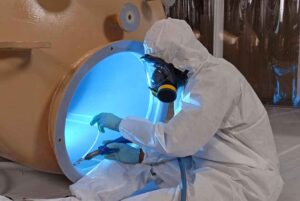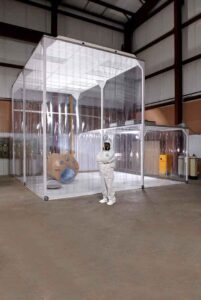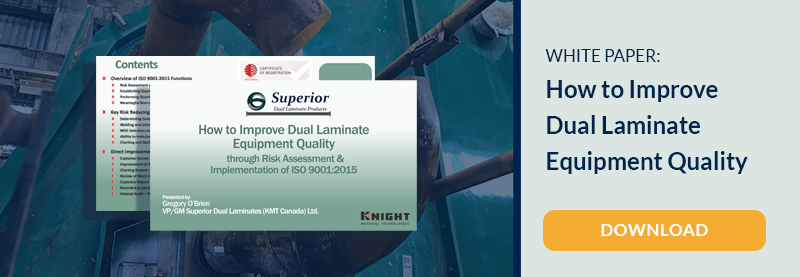The Heart of Ultra High Purity Linings: Our Class 10,000 Clean Room
Published on: November 19, 2024 Topics: LiningsGlobal manufacturers are wrestling with the demands of a new industrial revolution. The Internet of Things (IoT) is one catalyst within a larger technological and industrial evolution requiring cleaner, more controlled manufacturing environments. In terms of clean and controlled, the margin between streamlined processes and product acceptance or breakdown and rejection can hinge on the tiniest of contaminants.
Electro Chemical Manufacturing (ECM) is committed to maintaining a position at the forefront of this technological revolution where chemicals for semiconductors need higher purity than ever before. Our state-of-the-art Class 10,000 clean room is the cornerstone of our commitment to ultra high purity (UHP) manufacturing, enabling ECM to meet and exceed the most stringent industry demands.
In this highly controlled manufacturing era, where a single microscopic particle can derail process batches and productivity on the line, the ECM controlled environment – measuring virtually parts-per-trillion levels of contamination – transforms the seemingly impossible into reality for our customers.
What qualifies an environment as a clean room?
A clean room is a controlled environment where the concentration of airborne particles is strictly limited. But what does “Class 10,000” really mean? To put it in perspective, the air in a typical office building contains between 500,000 to 1,000,000 particles (0.5 microns or larger) per cubic foot. Our Class 10,000 clean room, by contrast, is designed to contain no more than 10,000 particles per cubic foot – a 50-fold reduction in airborne contaminants.
Creating and maintaining such an environment is no small feat. It requires constant filtration and air control to remove contaminants generated by people, processes, facilities and equipment. Every aspect of the room, from the materials used in construction to the clothing worn by technicians is carefully chosen to minimize particle generation.
The challenges of accommodating an ISO container for high purity lining applications
One of the unique features of our Class 10,000 clean room is its ability to accommodate ISO containers. The need for this level of impurity control for equipment of this size presents significant challenges:
- Air Flow: Clean rooms are typically small to make contamination control manageable. Handling an ISO container requires a much larger space, increasing the challenge of maintaining and controlling consistent air quality.
- Entry and Exit: Moving large containers in and out of the clean room without compromising the environment requires carefully designed airlocks and procedures.
- Power Requirements: Larger clean rooms need more power for air handling, lighting and equipment, increasing operational costs.
- Maintenance: A larger space means more surface area to clean and maintain to Class 10,000 clean room standards.
Despite these challenges, ECM’s investment in this capability allows us to offer unparalleled services in UHP fluid containment system fabrication and welding.

Continuous improvement: The key to ultra high purity linings
As with any ISO 9001-certified company, ECM is committed to continuous improvement. This isn’t just a buzzword but a regular business practice of collaboration with customers and suppliers to identify, develop and implement value-added innovations. This approach has led to several key investments:
- Fully documented ISO 9001 processes and procedures
- Comprehensive employee training on ISO procedures
- An 18-megohm deionized (DI) water system for final rinsing and cleaning
- A mass spectrometer for helium leak testing of all plastic welds
- An Enterprise Resource Planning (ERP) system for real-time production tracking
The helium leak testing carries special significance and calls special attention to one of these key investments. Helium leak testing is a critical quality control measure in industries that require ultra-high purity and hermetic sealing, something not universally found among lining suppliers.
This non-destructive testing method uses helium, the element with the smallest atomic size, to detect even the tiniest leaks in systems or components that other methods might miss. The significance of this testing lies in its exceptional sensitivity, capable of detecting leaks as small as 1×10-12mbar, to help provide reliability and integrity to applications from semiconductor to pharmaceutical to aerospace components.
In chemical containment systems, helium leak testing verifies the absence of pinholes or imperfections in welds and materials to maintain the purity of contained chemicals and prevent contamination or environmental release. This technique enhances product quality and safety and contributes to regulatory compliance. Test results and verification can significantly reduce long-term maintenance costs by identifying potential defects before they occur. ECM provides helium testing to underscore a commitment to precision and reliability for containment systems where even microscopic imperfections can have major consequences.
Stringent procedures for uncompromising quality
ECM’s commitment to quality extends to every aspect of its operations. Some of its key procedures include:
- Dedicating equipment for cleanroom use only
- Requiring technicians to wear low particle generation uniforms
- Spark testing all weld seams to ensure integrity
- Helium leak testing all UHP fabricated systems
- Hand-wiping fabricated equipment with semiconductor-grade isopropyl alcohol, followed by soaking and rinsing with 18 meg ohm DI water
These procedures ensure that every product leaving our facility meets the most stringent part-per-billion purity requirements.
Serving the future of high purity containment applications for semiconductor manufacturing and other industries
Whether a company focuses on semiconductor manufacturing, pharmaceuticals, or any industry requiring ultra-high purity chemical containment, ECM has the expertise, facilities and dedication to meet your requirements.
In the race for ultra-high purity, every particle counts. With Electro Chemical Manufacturing, companies can be confident they are partnering with a leader in the field, ready to tackle the purity challenges of today and tomorrow.
Contact ECM today to learn how our clean room capabilities can support your most demanding projects.





